Occupy Central
Occupy Central is a civil disobedience movement which began in Hong Kong on September 28, 2014. It calls on thousands of protesters to block roads and paralyse Hong Kong's financial district if the Beijing and Hong Kong governments do not agree to implement universal suffrage for the chief executive election in 2017 and the Legislative Council elections in 2020 according to "international standards." The movement was initiated by Benny Tai Yiu-ting (戴耀廷), an associate professor of law at the University of Hong Kong, in January 2013.
Umbrella Movement
The Umbrella Movement (Chinese: 雨傘運動; pinyin: yǔsǎn yùndòng) is a loose political movement that was created spontaneously during the Hong Kong protests of 2014. Its name derives from the recognition of the umbrella as a symbol of defiance and resistance against the Hong Kong government, and the united grass-roots objection to the decision of the Standing Committee of the National People's Congress (NPCSC) of 31 August.
The movement consists of individuals numbering in the tens of thousands who participated in the protests that began on 28 September 2014, although Scholarism, the Hong Kong Federation of Students, Occupy Central with Love and Peace, groups are principally driving the demands for the rescission of the NPCSC decision.
The movement consists of individuals numbering in the tens of thousands who participated in the protests that began on 28 September 2014, although Scholarism, the Hong Kong Federation of Students, Occupy Central with Love and Peace, groups are principally driving the demands for the rescission of the NPCSC decision.
Occupy Central site in an area surrounding the Legislative Council and Central Government Offices at Tamar were cleared 22-06-2015.
Hong Kong reform vote
The Hong Kong government’s political reform proposal for how the city elects its leader by universal suffrage for the first time in 2017 is based on a strict framework set by Beijing. The plan limits the number of candidates to two or three and requires them to win majority support from a 1,200 strong nominating committee. Arguing that this does not constitute genuine universal suffrage, pan-democratic lawmakers have vowed to reject the package, while pro-democracy groups have protested. The government’s resolution was to be put to a vote by the 70-member Legislative Council in June 2015, requiring a two-thirds majority to be passed.
POST OCCUPY CENTRAL - DAY 231
POST REFORM VOTE:DAY 46
POST REFORM VOTE:DAY 46
Full coverage of the day’s events on 03-08

Former secretary for the civil service Paul Tang Kwok- wai said he had planned to stay at his post until 2017 until unforeseeable family circumstances cropped up.
In an interview with RTHK, Tang said "things have happened quickly," and that many colleagues did not expect him to resign so soon.
"Because of unforeseeable family circumstances, it will be better to spend more time with my family ... [I mean] all family members," he said.
Asked by the show host whether it was a hasty decision, Tang replied: "Things have happened quickly in the world, well ... yes, it was a prompt decision. Indeed, I also needed to adjust my mind-set."
There has been speculation that Tang was forced to resign, but Tang insists he got on well with Chief Executive Leung Chun-ying and Chief Secretary Carrie Lam Cheng Yuet-ngor. However, he acknowledged he had differences of opinion with some civil servant groups regarding the pay adjustment issue.
"I represented the `capital' side, I also needed to consider the issue from a comprehensive angle ... sometimes you need to stand firm for a good cause. I absolutely knew that some colleagues had their opinions about me."
He added that Leung was concerned about the morale of civil servants, and had approved the increased recruitment of manpower for this fiscal year.
He described his successor, Clement Cheung Wan- ching, as a very capable person.
Tang stressed he did his best, defended the core values of civil servants, and had no regrets. "I had been in this position for three years. I have asked myself about my performance, and my answer is: `I have no regrets. I have done my best.' Was my performance perfect? There is always room for improvement. I have done my job ... upholding the core values of civil servants."
Tang said civil servants should remain neutral and fair, but it does not mean they cannot express political views. However, what is most important is that civil servants should not send an image to the public that they are biased in the execution of their duties.
Civil servants need to provide objective and comprehensive analysis to the government, and to support the chief executive regardless of who it is.
Police seek advice from justice department on superintendent assault case
Hong Kong police are seeking legal advice from the Department of Justice regarding an allegation that a retired superintendent assaulted pedestrians during last year’s pro-democracy Occupy protests.
Alan Lau Yip-shing, director of the police’s operations department,said in an RTHK programme on Saturday that the police force is “carefully considering” the report by the Independent Police Complaints Council (IPCC). It is seeking legal advice from the Justice Department before deciding upon the next step, Lau said.
He asked the public to give police and the IPCC time to handle the case, and promised to release updates as soon as possible.

Lau Yip-shing (small picture) speaks in an RTHK programme on Chu’s case. Photo: Apple Daily & Stand News.
Retired superintendent Chu King-wai was filmed hitting pedestrians in Mong Kok in November last year. Upon receiving complaints from a man who was videotaped being hit by Chu, the Independent Police Complaints Council (IPCC) investigated the case and reportedly voted 12:6 in favour of substantiating Chu’s case of assault last month.
Police rejected the IPCC’s ruling two weeks ago and asked for another vote on the case, upsetting the public and sparking several small protests. The IPCC subsequently held a meeting to discuss whether to accept new documents submitted by the police on July 23, and decided to uphold its ruling.
The IPCC publicity committee chairman said that the council members had watched the related videos over 100 times, and have a “clear understanding of what the officer was doing”.
If police insist on overturning the IPCC’s decision, the IPCC will need to submit a report to Chief Executive Leung Chun-ying who will make a final decision on the case. Some are worried that Leung would not handle the case with impartiality.
In a testimony obtained by local newspaper Ming Pao, Chu is quoted saying that he “unintentionally touched” pedestrians with his baton, and that he was only using his baton “as an extension of [his] arm to pat” Cheng.
A number of alleged police abuse cases emerged during the Occupy demonstrations last year. The police force has subsequently suffered a drop in public trust, according to a recent CUHK survey. Another survey conducted by HKU in June found that public satisfaction with the police force had declined to its lowest level since 2012.

TVB footage shows seven police beating Ken Tsang.
In another widely publicised Occupy-related case, seven police officers were arrested after TV footage emerged showing them beating Ken Tsang, a member of the Civic Party. Lau, the police operations director, said that the case had been handed over to the Justice Department and was a priority. He said the police would not tolerate any violation of the law by its own officers.
'Breasts are not weapons,' say Hong Kong protesters
Story highlights
- Hong Kong woman sentenced to 3.5 months in jail for "assaulting a police officer" with her breast
- Protesters tell CNN the sentence is ridiculous, alarming, sexist
Hong Kong (CNN)Forget umbrellas: The newest symbol of protest in Hong Kong is the bra.
That's what dozens of angry citizens wore Sunday in a demonstration against what they say is an absurd and sexist ruling: The sentencing of a female protester to three and a half months in prison for "assaulting a police officer" with her breast.
Ng Lai-ying's chest bumped the right arm of policeman Chan Ka-Po during a crowded protest against mainland Chinese border traders in March.
Amateur footage from the chaotic incident cited by local news reports shows the 30-year-old woman falling to the ground during an interaction with police officers. It's unclear what happens next, but when she reemerges her face is bleeding.

Hong Kong citizens protest over shopping 02:53
During her trial, Ng pleaded not guilty, saying she cried "indecent assault" when the police officer's hand landed on her breast, according to the South China Morning Post.
But a local magistrate rejected the claim and accused her of lying.
"You used your female identity to trump up the allegation that the officer had molested you. This is a malicious act," said deputy magistrate Chan Pik-kiu, adding Ng had harmed the officer's reputation with her accusation.
'Ridiculous, alarming'
Protesters who gathered outside the Wan Chai Police Headquarters in downtown Hong Kong chanted "breasts are not weapons" and said the ruling against Ng was ludicrous.
"I believe we are all baffled as to how a breast attack works," said Ng Cheuk Ling, a 24-year-old activist with the Hong Kong Women's Coalition on Equal Opportunities.
"It's ridiculous and alarming that the judge didn't just convict the protester of assaulting police with her breast, but that her seeking help was also considered part of the assault," she told CNN. "Should we silence ourselves in the face of sexual violence?"
"If this sets a precedent, the police will not only abuse their power but also strip women of their rights to take part in protests. Sexual harassment becomes a tactic for police suppression."
Pro-democracy legislator "Long Hair" Leung Kwok-hung said the sentence was an "insult to all the women on this earth."
"Breasts are the origins of human beings; no one can survive without the breasts of their mothers," he told CNN.
"I think if anyone on this earth treats the breasts of women as a weapon, it's totally outrageous."
Hong Kong protest over 'breast as weapon' conviction
- 7 hours ago
- China
Dozens of bra-wearing men and women have protested in Hong Kong after a woman was jailed for assaulting a senior policeman with her breast.
Ng Lai-ying, 30, had accused Chief Inspector Chan Ka-po of touching her breast during a protest in March.
But the court had ruled against her, saying she deliberately pushed her breast against him so she could accuse him of assault.
She was sentenced on Thursday to three months and 15 days in prison.
About 200 people joined the Breast Walk protest outside police headquarters in Wan Chai on Sunday - either wearing exposed bras or waving them - saying that a breast was "not a weapon".
Ng had been taking part in a protest in Yuen Long against Chinese mainlanders visiting Hong Kong to buy cheaper and better quality produce, a long-running controversial subject in the territory.
She said that during scuffles with police, Chief Inspector Chan had tried to grab her bag, but his hand had landed on her breast.
She accused him of indecent assault, but he in turn accused her of using her breast to assault him.
The Tuen Mun court found her guilty in July, with magistrate Michael Chan Pik-kiu saying she had tried to damage the policeman's reputation.
She had used "her female identity to trump up the allegation that the officer had molested" her, the South China Morning Post quoted him as saying.
At her sentencing on Thursday, Mr Chan said that if he did not "hand down a deterring sentence, the public might mistakenly think it is a trivial matter to assault police officers during protests".
The magistrate has also said he received personal threats after the verdict.
Those protesting on Sunday said the ruling was "ridiculous".
Retired teacher James Hon, who noted it was his first time wearing a bra, told AFP news agency: "We have come to this rather odd method to tell the world how ridiculous it is."
"The ruling is absurd. How can breasts be a weapon?" said activist Ng Cheuk-ling, saying she feared it would deter women from taking part in political protest.
"Police must review their guidelines to handle female protesters," she told AFP.
Another man told the Post: "The way I dress today looks quite ugly as a male, but it is not as ugly as the judgment, which is like pointing at a deer and calling it a horse."
The Post said the protest was illegal, but those taking part left peacefully before handing over a petition.







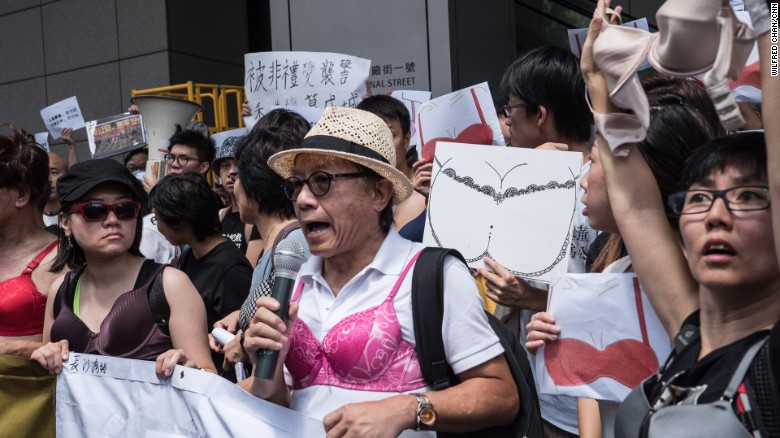



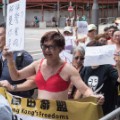
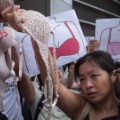
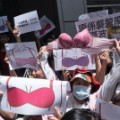
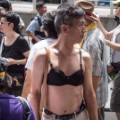
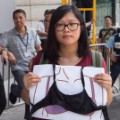
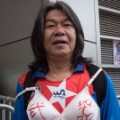
沒有留言:
張貼留言